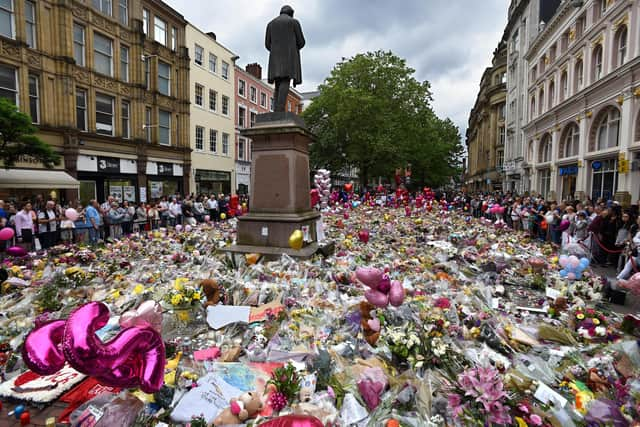Canon Ian Ellis: Churches and other venues will need to have contingency plans for the dreadful eventuality of a terror attack


Shortly after worship commenced, terrorists shot and killed three of those present, Harold Browne, Victor Cunningham and David Wilson. Seven others were injured.
I was a curate in Armagh at the time and remember well how the atrocity shocked the community and led for a time to certain extra security precautions being put in place at churches when services were being held.
Advertisement
Hide AdAdvertisement
Hide AdThe issue of terrorism and religion has taken on new and global proportions in light of suicide bombings by militant Islamists and, ultimately, al-Qaeda's September 11, 2001 ('9/11') attacks in the United States.
More recently, the Islamic extremist Manchester Arena suicide bombing in 2017 saw 22 people killed and over 1,000 injured.
The bomber reportedly was motivated by the death of children as a result of US involvement in the civil war in Syria and by the gang murder of a friend in Manchester.
In fact, as the BBC has reported, the Chairman of the Manchester Arena Inquiry, Sir John Saunders, has highlighted a number of failures of the emergency response to the suicide bombing and said avoidable mistakes had been made.
Advertisement
Hide AdAdvertisement
Hide AdOne of the victims of the Manchester Arena bombing was Martyn Hett, whose name has been given to related legislation.
Martyn's Law - the Terrorism (Protection of Premises Bill) - will require social venues and local authorities to put in place preventative plans against possible terror attacks. This is termed the Protect Duty.
In the recent King's Speech, it was indicated that this legislation will be introduced “to protect public premises from terrorism in light of the Manchester Arena attack”.
An accompanying government commentary explained: “The Bill will require certain venues to fulfil necessary but proportionate steps according to their capacity to mitigate the impact of a terrorist attack and reduce harm. The duties that premises will have will depend on the size of the venue. Premises and events with a capacity of 800 or above will be in the enhanced tier, while premises with a capacity of 100 to 799 will be in the standard tier.”
Advertisement
Hide AdAdvertisement
Hide AdIt was also indicated that, ahead of introducing the Bill in Parliament, the government intends to launch a consultation on the standard tier.
The purpose of the consultation will be to ensure that legislated measures will “strike the right balance between public protection and avoiding undue burdens on smaller premises such as village halls, churches and other community venues”.
The legislation is intended to be UK-wide, although some people have queried whether it is necessary in Northern Ireland.
Excluding Northern Ireland would signal quite a turnaround from the days of Darkley.
Advertisement
Hide AdAdvertisement
Hide AdIndeed, it would seem unwise to assume that no such atrocity as the Manchester Arena attack would ever happen here. To adapt the phrase, such an attitude could tragically turn out to be infamous last words.
For one thing, when planning an attack, extremists can be expected to seek out weak points. For another, there are still dissidents in our midst.
The legislation is being introduced as applicable throughout the devolved nations as well as in England because national security is a reserved matter for the UK government.
The fact that churches are vulnerable to attacks in the course of conflicts was a matter that was discussed recently at an online event held by the Conference of European Churches (CEC), of which the Church of Ireland and the Methodist and Presbyterian Churches in Ireland are full members.
Advertisement
Hide AdAdvertisement
Hide AdThis event brought my mind back not only to the Darkley attack but also, more recently, to the summer of 2016 when, in a Roman Catholic church in the Normandy town of Saint-Étienne-du-Rouvray, two Islamic State sympathisers brutally killed the 85-year-old priest, Fr Jacques Hamel, while he was conducting mass, and took five others as hostages.
A nun managed to escape the scene and raised an alert. The two attackers were then shot and killed by special unit police.
According to a Guardian report, the priest had served in the Franco-Algerian war but had refused an officer’s commission because he would not order anyone to kill another person.
To return to the CEC event referred to above, Radovanovic Aleksandar, a lawyer of the Serbian Orthodox dioceses of Raska and Prizren, said that “the international community needs to be aware and help implement laws that ensure the security of worship places”.
Advertisement
Hide AdAdvertisement
Hide AdCEC staff member Dr Elizabeta Kitanovi elaborated on this point: “Targeting places of worship has become a weapon employed both in geopolitical conflicts and by totalitarian ideologies. The wounds, the memories, and the humiliation that result from attacks on places of worship provoke and feed ongoing disputes [and] lasting prejudice, while giving rise to hatred.”
Also at the event, Professor Liudmyla Fylypovych, from the Institute of Philosophy of National Academy of Sciences of Ukraine, pointed out how the protection of religious buildings is a significant issue for Ukraine.
She said that since the Russian invasion of her country, when shelling, missile strikes, aerial bombardment and the destruction of people and property began, “the issue of religious buildings escalated to the maximum”.
It would appear that churches, alongside other organisations that host members of the public, are going to have to have their contingency plans for the dreadful eventuality of a terror attack.
One would expect that advice will follow.
• Canon Ian Ellis is a former editor of The Church of Ireland Gazette